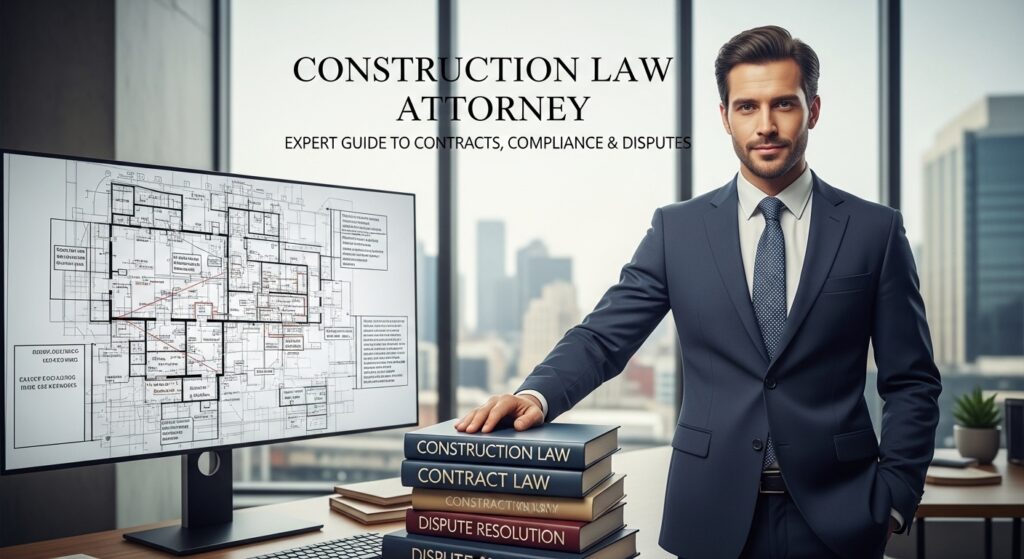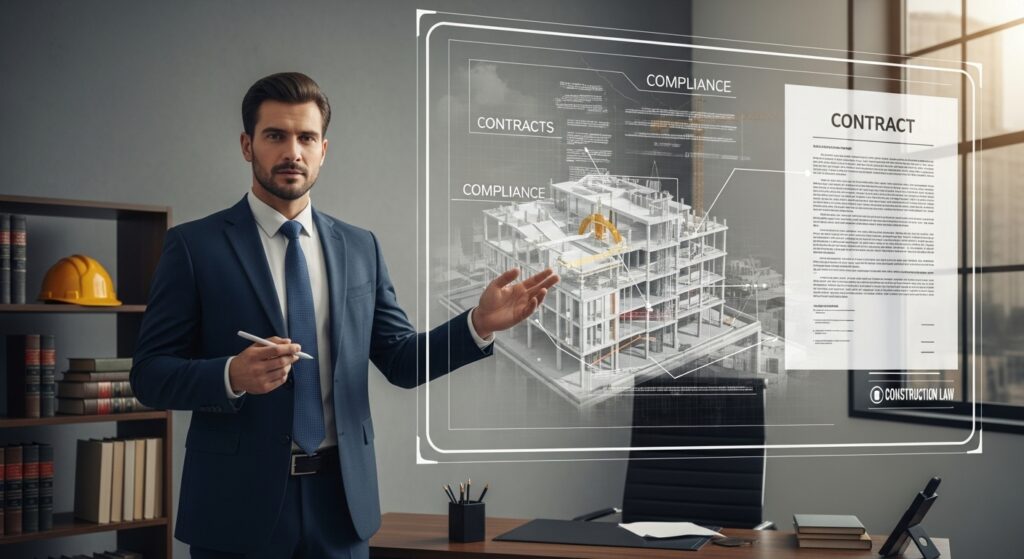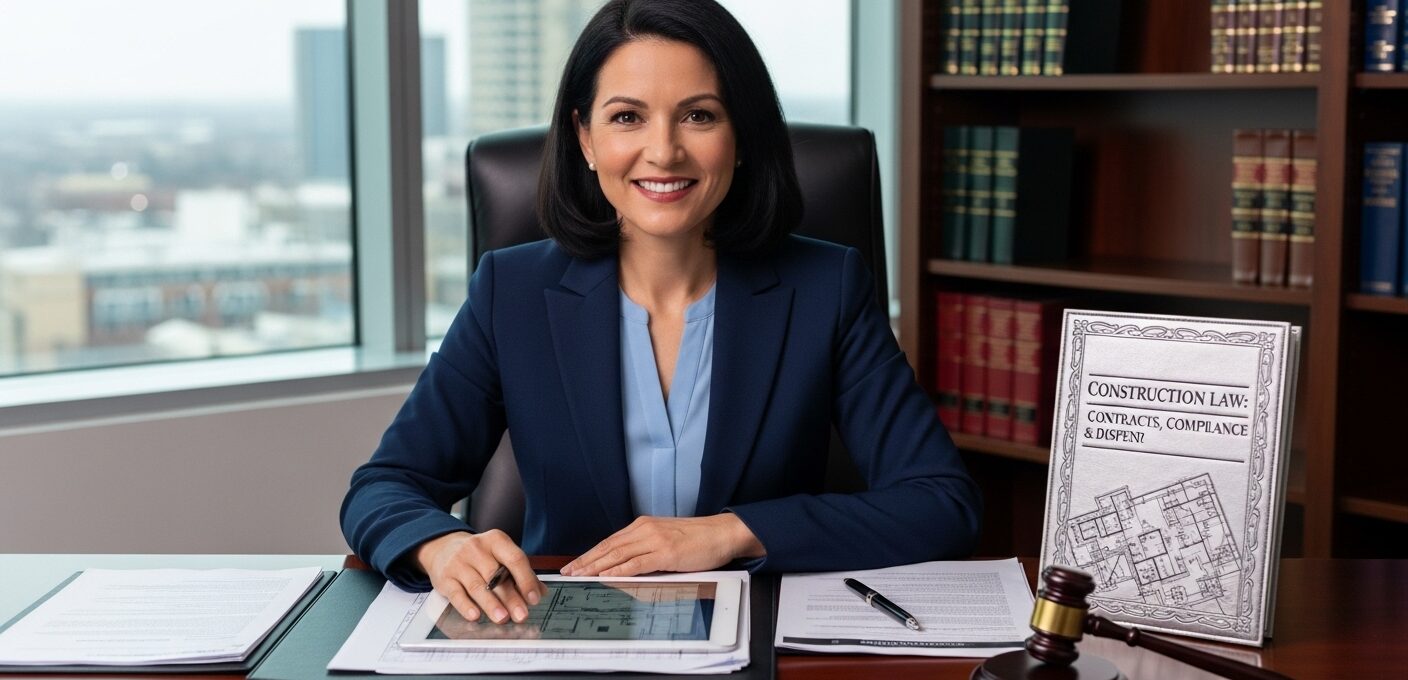Table of Contents
Why Construction Projects Need Legal Support
Every construction project carries risks: contract disputes, compliance fines, payment issues, and unexpected delays. According to industry studies, over 30% of construction projects face legal disputes, and non-compliance with building codes or OSHA standards can shut down a project overnight.
This is where a construction law attorney (or construction lawyer) becomes essential. Their role goes beyond simply drafting paperwork they safeguard your project’s timeline, budget, and legal standing. From reviewing contracts to navigating complex regulations and resolving conflicts, a skilled attorney ensures your project runs smoothly.
What Does a Construction Law Attorney Do?
A construction law attorney specializes in legal issues related to the building industry. Their services include:
- Drafting and reviewing contracts
- Securing permits and ensuring compliance with local, state, and federal regulations
- Advising on insurance and bonding requirements
- Representing clients in disputes, mediation, or litigation
Think of them as a partner in risk management. They spot potential legal pitfalls before they become costly problems.
Key Elements of Construction Contracts

Contracts are the backbone of every project. A construction lawyer ensures these agreements are clear, enforceable, and protect all parties involved.
Essential contract elements include:
- Scope of work – Define exactly what is being built.
- Payment schedules – Avoid disputes by spelling out timing and amounts.
- Timelines and milestones – Set realistic deadlines and remedies for delays.
- Change order clauses – Cover how modifications will be handled.
- Dispute resolution provisions – Establish mediation or arbitration steps before litigation.
By tightening these clauses, a construction law attorney reduces the risk of misunderstandings and future disputes.
Common Construction Contract Types
Different projects call for different agreements. Your attorney will advise which contract type best suits your situation:
- Fixed-Price Contracts – A set price agreed upfront; best for straightforward projects.
- Cost-Plus Contracts – Client pays actual costs plus a fee; useful for complex or uncertain projects.
- Time & Materials Contracts – Billing based on labor and supplies; ideal for urgent or small projects.
Choosing the wrong type of contract can expose you to unnecessary risks — an attorney ensures alignment with your project’s complexity and budget.
Ensuring Compliance in Construction Projects
Compliance is about following all laws, codes, and safety standards — missing just one requirement can stop a project in its tracks.
A construction law attorney helps by:
- Reviewing zoning laws and land use restrictions
- Ensuring OSHA safety compliance
- Securing building permits and environmental approvals
- Overseeing labor law requirements (wages, worker safety, union agreements)
Case Example
A developer once faced $50,000 in fines after failing to secure proper environmental permits. With an attorney’s early review, the issue could have been avoided entirely.
Steps to Maintain Compliance
Attorneys typically recommend the following process:
- Conduct an initial site and zoning assessment
- Obtain all necessary permits before work begins
- Train staff on safety protocols and legal obligations
- Schedule routine inspections to catch issues early
- Document every step for legal protection
These proactive measures keep your project moving without costly legal interruptions.
Handling Disputes in Construction Law
Disputes are one of the most common reasons clients hire a construction lawyer. They may involve contractors, owners, architects, or subcontractors.
Common Types of Disputes
- Contract Breaches – Missed deadlines, incomplete work, or failure to pay
- Design Errors – Flawed plans leading to costly rework
- Delay Claims – Disagreements over who caused project slowdowns
- Payment Disputes – Withholding payments or mechanics lien issues
Resolving Disputes: Options & Strategies
A construction law attorney will typically:
- Start with negotiation to reach a quick solution
- Move to mediation with a neutral third party
- Escalate to arbitration (binding decision outside of court)
- If needed, pursue litigation in court
By structuring contracts to include dispute resolution clauses, many conflicts can be resolved without lengthy lawsuits.
Liens and Payment Issues
Payment disputes are particularly sensitive in construction. Attorneys manage:
- Mechanics Liens – Filed to secure payment for contractors or subcontractors.
- Payment Bonds – Guarantees subs and suppliers receive payment, even if the contractor defaults.
- Lien Defense – Protecting property owners from wrongful lien claims.
Without legal support, payment disputes can stall projects or damage relationships.
Insurance and Bonding in Construction

Insurance and bonding are essential safety nets for construction projects. A construction law attorney ensures coverage matches project risks.
Key types of insurance include:
- General Liability – Covers third-party injuries or property damage
- Workers’ Compensation – Required for employee injuries
- Builders Risk Insurance – Protects against on-site property damage
- Professional Liability – Covers design errors for architects/engineers
Attorneys also review performance bonds and surety bonds to confirm contractors are financially backed to complete the job, construction law attorney.
Risk Management in Construction Projects
Every project carries risks from accidents to budget overruns. A construction lawyer helps mitigate risks by:
- Reviewing subcontractor agreements for liability gaps
- Advising on insurance and bond requirements
- Drafting clauses to manage force majeure events (e.g., supply chain issues, natural disasters)
When to Hire a Construction Law Attorney
You should consult an attorney:
- Before signing contracts – to avoid one-sided terms
- During project planning – to ensure compliance
- When disputes arise – to protect your legal and financial interests
- For compliance audits – especially in large or complex builds
Hiring early saves money by preventing disputes instead of fighting them later,, construction law attorney.
Future Trends in Construction Law
The construction industry is evolving and legal strategies must keep pace. Emerging trends include:
- AI in Contract Review – Automating clause analysis to flag risks faster
- Drones for Compliance – Site monitoring for OSHA and zoning checks
- Sustainability & ESG Laws – Stricter green building codes and renewable requirements
- Remote Work Clauses – Adapting contracts for distributed project teams
A knowledgeable construction law attorney stays ahead of these trends to protect your interests.
Selecting the Right Construction Law Attorney
Not all lawyers are the same. When choosing one, ask:
- What is your experience with construction law cases?
- How do you typically resolve disputes?
- Can you provide case examples?
- What are your fees and billing structures?
Look for attorneys with industry-specific expertise, strong communication skills, and proven results, construction law attorney.
Closing Words
Construction projects are high-stakes endeavors where contracts, compliance, and disputes can make or break success. Partnering with an experienced construction law attorney ensures your investment is protected, risks are managed, and disputes are resolved effectively.
Legal guidance is not just about avoiding problems it’s about building with confidence, finishing on time, and safeguarding your financial future.
FAQs
What services does a construction law attorney provide?
They handle contracts, compliance, disputes, risk management, insurance, and payment issues like liens.
Do I need a lawyer for construction contracts?
Yes. Attorneys ensure contracts are enforceable and protect your interests, reducing disputes.
What are common compliance issues in construction?
Building codes, OSHA safety rules, zoning restrictions, and environmental permits.
How are disputes usually resolved?
Most start with negotiation or mediation. If unresolved, arbitration or litigation may follow.
When should I hire a construction lawyer?
Ideally before contracts are signed or projects begin prevention is always cheaper than litigation.






